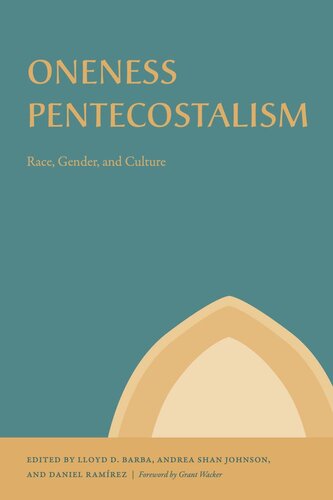

Most ebook files are in PDF format, so you can easily read them using various software such as Foxit Reader or directly on the Google Chrome browser.
Some ebook files are released by publishers in other formats such as .awz, .mobi, .epub, .fb2, etc. You may need to install specific software to read these formats on mobile/PC, such as Calibre.
Please read the tutorial at this link: https://ebookbell.com/faq
We offer FREE conversion to the popular formats you request; however, this may take some time. Therefore, right after payment, please email us, and we will try to provide the service as quickly as possible.
For some exceptional file formats or broken links (if any), please refrain from opening any disputes. Instead, email us first, and we will try to assist within a maximum of 6 hours.
EbookBell Team

4.7
26 reviewsThis volume traces the history of Oneness Pentecostalism in North America. It maps the major ideas, arguments, periodization, and historical figures; corrects long-standing misinterpretations; and draws attention to how race and gender impacted the growth and trajectories of this movement.
Oneness Pentecostalism emerged in the aftermath of the Azusa Street Revival (1906–9), baptizing its members in the name of Jesus Christ rather than the Father, Son, and Holy Spirit, and splintering from trinitarian Pentecostals. With its rapid growth throughout the twentieth century, especially among ethnic minorities, Oneness Pentecostalism assumed a diversity of theological, ethnic, and cultural expressions. This book reckons with the multiculturalism of the movement over the course of the twentieth century. While common interpretations tend to emphasize the restorationist impulse of Oneness Pentecostalism, leading to notions of a static, unchanging movement, the contributors to this work demonstrate that the movement is much more fluid and that the interpretation of its history and theology should be grounded in the variegated North American contexts in which Oneness Pentecostalism has taken root and dynamically developed.
Groundbreaking and interdisciplinary, this volume presents diverse perspectives on a significant religious movement whose modern origins are embedded within the larger Pentecostal story. It will be welcomed by religious studies scholars and by practitioners of Oneness Pentecostalism.
In addition to the editors, the contributors to this volume are Daniel Chiquete, Dara Coleby Delgado, Patricia Fortuny-Loret de Mola, Manuel Gaxiola, David Reed, Rosa Sailes, and Daniel Segraves.